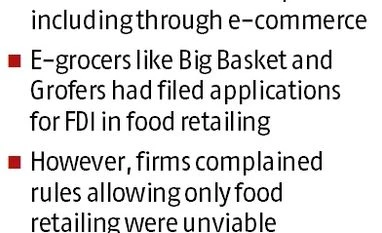"We are just waiting for the final approvals. We have finished most of the initial work, including looking for retail spaces and deciding on the manpower. Our blueprint for our offline retail plan is also ready and our back-end is in place," a senior vice- president of one of these entities told Business Standard.
In June last year, the government decided to allow up to 100 per cent foreign direct investment (FDI) in multibrand food retailing, including through e-commerce. However, the products have to be produced, processed or manufactured in the country.
Multinational retailer Amazon had filed its application with the department of industrial policy and promotion (DIPP) in January. Domestic entities Grofers and Big Basket had earlier done so. However, the government decision drew little interest from other major international retail players, which complain that having 'food only' stores was not viable. Walmart and France's Auchan Group have indicated their interest in investing if the government allows 'food plus' or sales of other items of a household nature as well.
While the food processing ministry has been in favor, arguing for allowing food retailers to sell non-food items to the tune of 25 per cent of all shelf products, DIPP and the finance ministry were among those with reservations. "The applications had been kept aside until recently but now that a consensus on the matter of 'food plus' has been arrived at, they are being examined again," a senior government official said on condition of anonymity.
This follows confirmation by Business Standard from senior officials across ministries regarding the government's plan on soon announcing a 'next big wave' of liberalisation in FDI rules.
A cabinet note in this regard is being prepared. It is expected to include the allowing of FDI in multibrand retailing beyond only domestic food products. Since this is a touchy issue, the government had been cautious, another official said. The note follows inter-ministerial consultations on FDI, which are nearly complete, he added.
The note could also see single-brand retail FDI being put on the automatic route for approval in its entirety, as well as the FDI cap in print media being extended from the present 26 per cent to 49 per cent, sources said. While 100 per cent FDI is allowed, 49 per cent is through the automatic route and beyond that through the approval route. A proposal to allow 100 per cent FDI through the automatic route, provided the sourcing norms are met, could also be considered.
If such a proposal is accepted by the government, it could mean that companies like Apple and Zara can sell in India through wholly owned subsidiaries.
Regarding FDI in print media, while the bureaucracy has no issue with the proposal, it has become a political issue. "The issue is a sensitive one and discussions have been guided by the Prime Minister's Office on multiple occasions," an official added.

To read the full story, Subscribe Now at just Rs 249 a month
Already a subscriber? Log in
Subscribe To BS Premium
₹249
Renews automatically
₹1699₹1999
Opt for auto renewal and save Rs. 300 Renews automatically
₹1999
What you get on BS Premium?
-
Unlock 30+ premium stories daily hand-picked by our editors, across devices on browser and app.
-
Pick your favourite companies, get a daily email with all news updates on them.
Full access to our intuitive epaper - clip, save, share articles from any device; newspaper archives from 2006.
Preferential invites to Business Standard events.
Curated newsletters on markets, personal finance, policy & politics, start-ups, technology, and more.
Need More Information - write to us at assist@bsmail.in



)